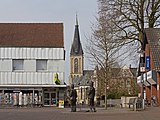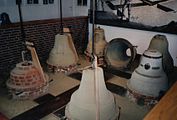Steinfurt is a Kreis (district) in the northern part of North Rhine-Westphalia, Germany. Neighboring districts are Bentheim, Emsland, district-free Osnabrück and the Osnabrück district, Warendorf, district-free Münster, Coesfeld, Borken.
Borken is a Kreis (district) in the northwestern part of North Rhine-Westphalia, Germany in the Münster region. Neighboring districts are Steinfurt, Coesfeld, Recklinghausen, Wesel, Cleves, Bentheim in the Lower Saxony and the Dutch provinces Gelderland and Overijssel. The two biggest cities are Bocholt and Gronau.

Borken is a town and the capital of the district of the same name, in North Rhine-Westphalia, Germany.

Coesfeld is a Kreis (district) in the northwestern part of North Rhine-Westphalia, Germany, west of the city of Münster. Neighboring districts are Steinfurt, district-free Münster, Warendorf, district-free Hamm, Unna, Recklinghausen, Borken.
Warendorf is a Kreis (district) in the northern part of North Rhine-Westphalia, Germany. Neighboring districts are Steinfurt, Osnabrück (district), Gütersloh, Soest, district-free city Hamm, Coesfeld and the district-free city Münster.
Recklinghausen is a Kreis (district) in the centre of North Rhine-Westphalia, Germany. It is surrounded by the neighbouring districts of Borken, Coesfeld, Unna, Gelsenkirchen, Bottrop, and Wesel. The district administration is located in the city of the same name.
Kleve or Kreis Kleve is a Kreis in the Lower Rhine region of northwestern North Rhine-Westphalia, Germany. Neighbouring districts are Borken, Wesel, and Viersen in Germany, and the Dutch provinces of Limburg and Gelderland.

The Berkel is a river in the Netherlands and Germany. It is a right tributary of the IJssel.
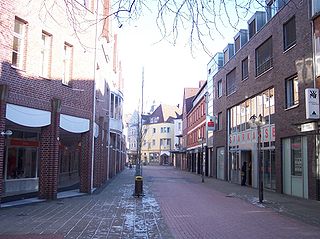
Coesfeld is the capital of the district of Coesfeld in the German state of North Rhine-Westphalia.

Stadtlohn is a city in western Münsterland in the northwest of North Rhine-Westphalia, and is a district town of the Borken administrative district. The city had a population of 20,746 inhabitants as of 2020. The River Berkel flows through the city on its way to the Netherlands.

Kaarst is a town in Germany. It lies in the district of Rhein-Kreis Neuss in North Rhine-Westphalia. It is 5 km west of Neuss and 12 km east of Mönchengladbach.

Nottuln is a municipality in the district of Coesfeld in the state of North Rhine-Westphalia, Germany.
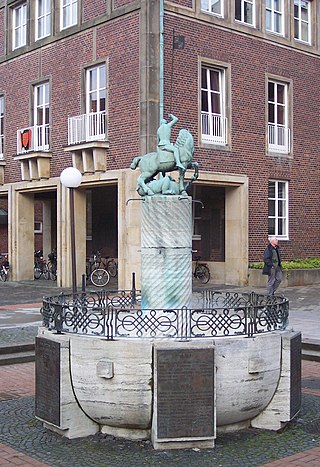
Ahaus is a town in the district of Borken in the state of North Rhine-Westphalia, Germany. It is located near the border with the Netherlands, lying some 20 km south-east of Enschede and 15 km south from Gronau. Ahaus is the location of one of Germany's interim storage facilities for radioactive spent fuel.

Gronau (German pronunciation: [ˈɡʁoːnaʊ]; officially Gronau , is a town in the district of Borken in North Rhine-Westphalia, Germany. It is located near the border with the Netherlands, approx. 10 km east of Enschede. Documentary evidence of Gronau dates to 1365.

Isselburg is a town in the district of Borken, in North Rhine-Westphalia, Germany. It is located on the river Issel, near the border of the Netherlands, and approximately 10 km west of Bocholt.

Legden is a municipality in the district of Borken, in North Rhine-Westphalia, Germany. It is located between Ahaus and Coesfeld.
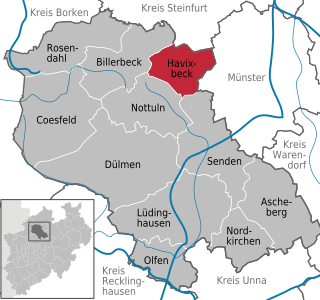
Havixbeck is a municipality situated on the north-east edge of the Baumberge in the district of Coesfeld, in northern North Rhine-Westphalia, Germany. It is located approximately 15 km west of Münster.

Senden is a municipality in the district of Coesfeld, in North Rhine-Westphalia, Germany.

The Dortmund–Enschede railway is an international railway connecting the eastern Ruhr district of Germany to Enschede in the Netherlands, which was built by the Dortmund-Gronau-Enschede Railway Company.

Coesfeld Station (Westphalia) is the main railway station of the town of Coesfeld and an important transport hub in western Münsterland in the German state of North Rhine-Westphalia. It is a junction station on the Dortmund–Enschede, Essen-Coesfeld and Empel-Rees–Münster lines.







